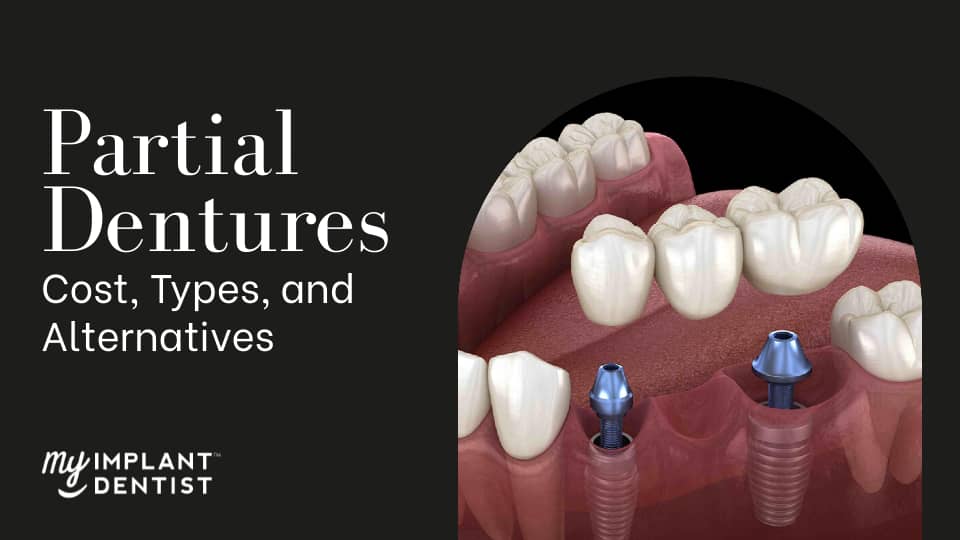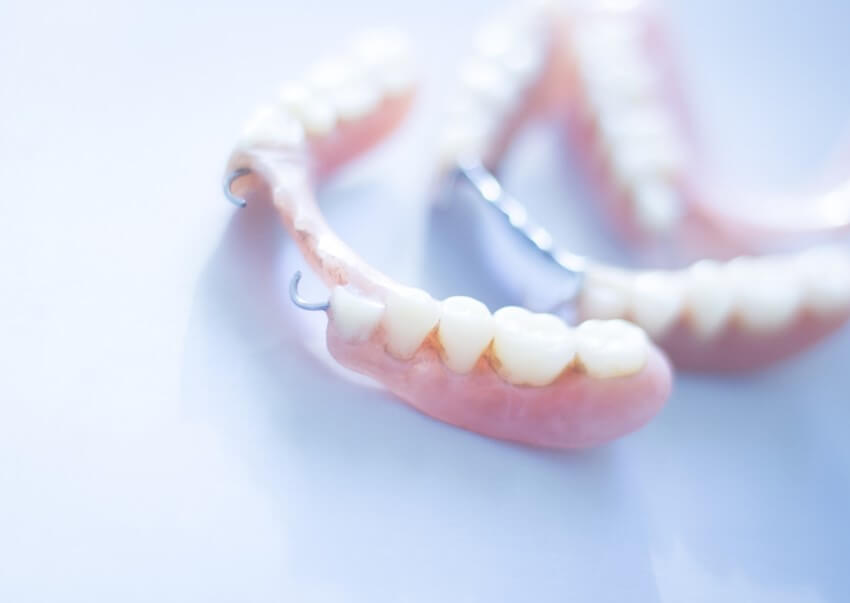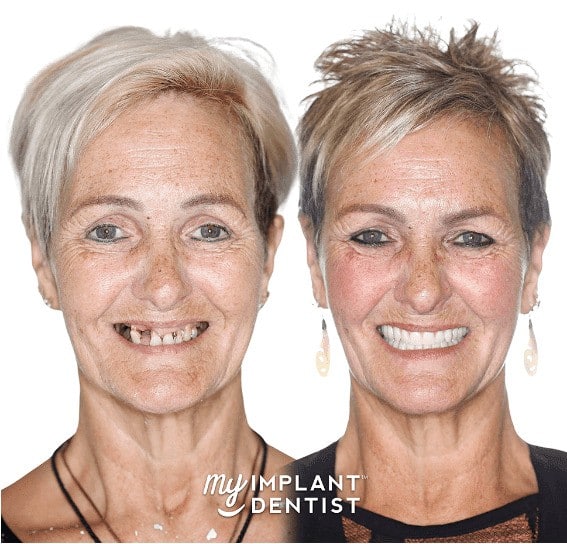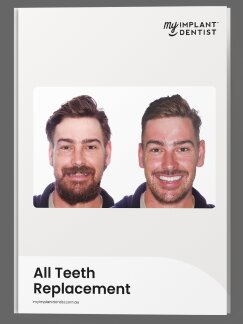
Contents
For whatever reason, some of your teeth may have gone missing, affecting your smile. The good news is that there are several ways to restore your lovely smile, including partial dentures.
Partial dentures are just what the name implies, as they restore your partially lost teeth. Your dentist will examine your tooth loss and oral health to see if partial dentures are right for you and what type. Otherwise, they may recommend some alternatives, which this post will cover.
Continue reading to see if you’d be interested in getting a set of partial dentures and the cost or their alternative.
Key Takeaways:
- Partial dentures can replace one or 15 of the teeth in your jaw.
- Partial dentures are held in place by metal clasps or suction from the roof of your mouth.
- Your partial dentures may be removable or permanently fixed onto your upper or lower jaw.
- Expect the cost of your partial denture in Australia to starts from $1,000 to $2,500 per jaw.
What Are Partial Dentures?
Partial dentures are a set of dental prostheses that replace some missing teeth in your upper or lower jaw. However, once the denture replaces a full arch, it becomes a complete denture.
The partial dentures are held in place by suction or metal and acrylic clasps. They possess remarkable retention as they derive support from the rest of a patient’s natural teeth.
The procedure for getting a partial denture could take 6-13 weeks to be completed. This varies and depends on your dentist or laboratory technician.

Do I Need Partial Dentures?
If you have lost some of your teeth, you will need a replacement, as missing teeth can cause various negative effects. Some of these are:
- You will experience jawbone loss and shrinkage of the gums.
- The missing teeth will make your face appear to fall as it loses structure.
- Your speech and pronunciation will be altered due to the space caused by the lost teeth.
- You may find it difficult to chew on certain tough and chewy foods which you may have once enjoyed.
- The gaps caused by missing teeth will make your remaining teeth shift from their natural positions.
Partial dentures can eliminate most of those negative effects and get your smile back. So, you should talk to a qualified dentist to determine whether partial dentures are right for you.
Different Types Of Partial Dentures
Partial dentures are divided into three types, and your dentist may recommend one over the other, depending on your particular situation. You can always ask them why a certain type of denture would be better and let them know your preferences.
Removable Partial Dentures
A removable partial denture requires you to take it off for cleaning and at night to let your gums rest and soak the dentures in water.
These dentures can be made from various materials and frameworks per your needs. The dental office should craft one most suited to you from the following.
Cast Metal Removable Partial Dentures
Cast metal dentures are the most popular partial dentures due to their long lifespan. They are constructed with a large metal framework that holds the artificial teeth and clasps onto your natural teeth.
The main disadvantage would be that your dentist cannot easily repair them once they break. So, it would help if you were careful not to drop them too hard or accidentally step on them. They may also damage your teeth at an accelerated rate, so you want to apply more thorough care to your natural teeth.
Flexible Partial Denture
Flexible partial dentures are made from nylon material and are secured tightly to the anchor teeth, yet less likely to break. These dentures are well suited for aesthetics as they mimic the appearance and colour of your natural teeth and gums.
One major disadvantage of the flexible partial denture is that your dentist cannot add new artificial teeth to the dentures. That means that you will need to get entirely new flexible dentures.
A common brand name for flexible dentures is the Valplast dentures. So, understand that your dentist may sometimes refer to flexible dentures as Valplast.
Acrylic Clasp Partial Dentures
These dentures are also called flippers and are mostly used temporarily until you get your permanent dentures or another dental prosthesis fitted. The acrylic clasp partial dentures are more likely to break than the other types.
The raft wire clips used to hold them in place are weak and can cause the dentures to feel loose. On that note, acrylic clasp partial dentures have a lifespan of about a year.
Fixed Partial Denture
Sometimes, patients may prefer their dentures to be fixed into their mouths as not many people want to go through the stress of taking partial dentures on and off daily.
The fixed partial dentures are typically held in place by your natural teeth or certain dental devices, so you don’t experience the discomfort of taking them out.
Fixed Bridge
A fixed bridge or partial denture comprises two crowns fitted onto adjacent teeth and holds the artificial replacement teeth in place. Your teeth need to be shaved down to accommodate the dental crowns.
The bridge may be made from metal, ceramic, or porcelain fused to metal (PFM). The ceramic and PFM variants give a more natural look than the metals, which may not blend well with your remaining teeth.
Implant-Supported Fixed Bridge
Implant-supported bridges are artificial teeth held in place by dental implants screwed into your jawbone. The dentures will fit the gap as they are secured into the implants.
The implants may likely be made from titanium, as it is biocompatible, or zirconia, a bioinert material. That means implants will cause no chemical reaction and can even fuse with your bone when inserted into your body.
Partial Dentures For Front Teeth
Losing your front teeth does not eliminate the possibility of a partial denture. Your dentist will create a custom denture that looks natural since the gap is at the front of your teeth.
You want to ensure that the dentist that fits your partial dentures for the front teeth is experienced and qualified. At My Implant dentist, our excellent dentists take extra care when carrying out your partial denture procedure.

How Much Do Partial Dentures Cost In Australia
The cost of partial dentures in Australia starts from $1,000 to $2,500 per jaw, depending on the type your dentist recommends.
In some cases, partial dentures treatment costs will be covered by your dental insurance plan, partially or in full. You can ask your insurance provider for details on that.
If you want to spread out your treatment cost, My Implant Dentist offers convenient payment plans to make the process seamless.
How Do I Decide Which Denture Is Best For Me?
You will have a thorough consultation with your dentist, where you will discuss everything surrounding your tooth restoration. So you can decide which material and type of denture would suit your needs.
Alternatives To Partial Dentures
Dental implants are a permanent and more effective alternative to partial dentures as they are more secure and preserve your jawbone. Additionally, dental implants mimic the feel and function of your natural teeth.
faqs
How Many Teeth Do You Need For Partial Denture?
You need at least one missing tooth to get a partial denture.
What Is The Most Comfortable Partial Denture?
This depends on your preferences, but cast metal and flexible partial dentures are the most effective.
How Long Do Partial Dentures Last?
If properly maintained, partial dentures can last for decades but typically have 10-15 years.
Which Is Better, A Bridge Or A Partial?
Bridges may be considered partial dentures, so the better option depends on your dental needs. Your dentist will make any clarifications you may need.
What Is The Average Cost Of A Partial Denture?
The average cost of a partial denture in Australia starts from $700 per denture but varies from patient to patient.




















